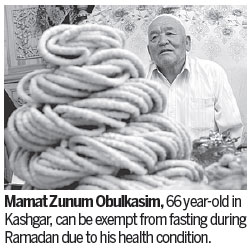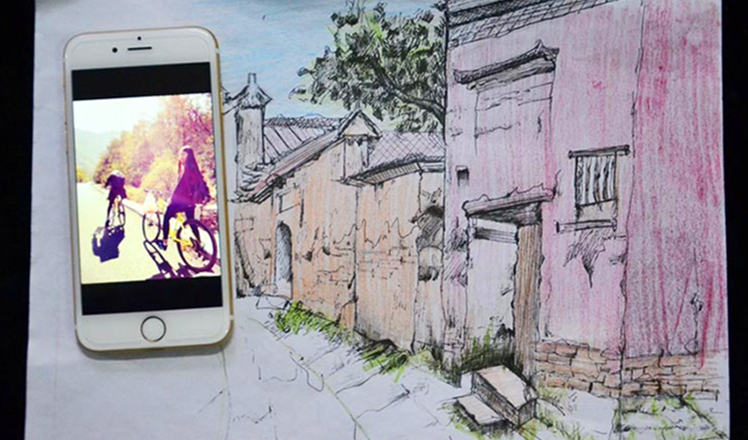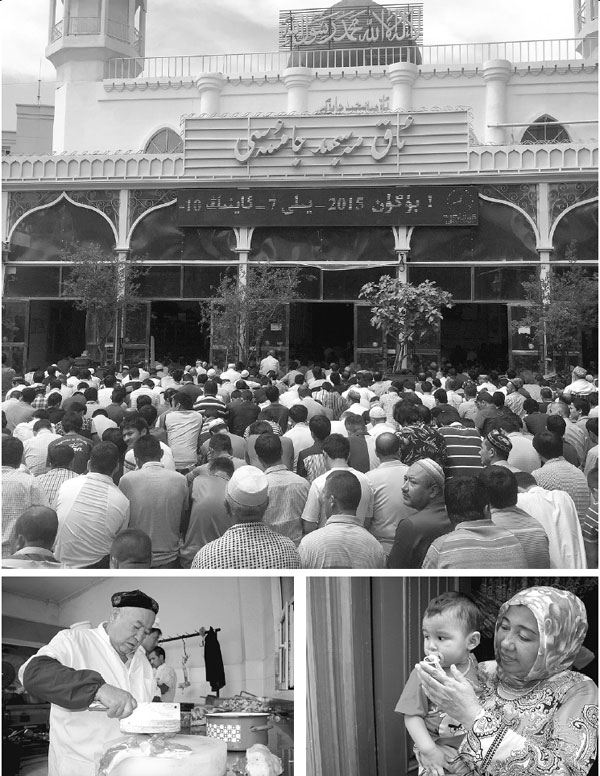When fasting reigns and breaks
Updated: 2015-11-27 07:23
By Hu Yongqi in Urumqi and Kashgar(China Daily USA)
|
|||||||||
A visit to Xinjiang Uygur autonomous region during Ramadan highlights how deeply traditions run there
It has always been a riddle to me how Muslims bear hunger and thirst during Ramadan, the month in which believers are required to abstain from eating and drinking during daylight hours. In a trip to the Xinjiang Uygur autonomous region that mystery was cleared up.
Apart from settling that matter on my trip to Xinjiang, I also fulfilled a long-held dream: getting a taste of Islamic culture in the autonomous region's capital, Urumqi, and Kashgar prefecture in southern Xinjiang.
|
Clockwise from top: Muslims make prayer at the Baida Mosque in downtown Urumqi; a mother holds her daughter outside their new house in the ancient town of Kashgar; a cook prepares food for Muslims to Baida Mosque for fast-breaking meal after sunset. Photos by Hu Yongqi / China Daily |
Ramadan was marked from June 18 to July 17, and given the number of Muslims in Xinjiang, it is perhaps inevitable that the signs of this yearly ritual were pervasive. The region is home to more than 12 million Muslims - about 55 percent of the population - and there are 24,000 mosques, says Ma Pinyan, a researcher at the Xinjiang Academy of Social Sciences.
During the month, worldly matters are supposed to take a back seat for Muslims as they give full attention to matters of faith and the spirit, aided by long hours of abstinence from oral sustenance.
Personal choice
On a Friday afternoon, I saw more than 3,000 Muslims attend Baida Mosque in downtown Urumqi, kneeling on a blanket and chanting passages from the Holy Quran led by an imam.

About 300 devotees who could not make it to the mosque on time lined up in the street to discharge their prayerful duties. Police patrolled nearby to ensure the safety of those taking part as prayers proceeded.
At the mosque, I met the assistant imam, Abdu Rahman, who was to lead the worship service on Fridays by chanting the Holy Quran and urging Muslims to do good to others. One of his roles is to instruct believers to educate children in line with Islamic tradition, and leading upright lives in accordance with this.
"The mosque receives about 1,200 Muslims each day before and after Ramadan, but during Ramadan more than 3,000 Muslims come for prayers each day," Abdu Rahman said. "The biggest number of people we have had is 10,000."
Abdi Ghufur, the muezzin who calls believers to pray at the mosque, said adult Muslims other than pregnant women, the elderly, the sick and the infirm must fast and pray. About 80 percent of fasting Muslims coming to the mosque were 18 to 35 years old.
In Ramadan, four hours of sleep a day had left Abdi Ghufur and his fellow believers doing 20 hours of service a day at the mosque with eyes that were dry and red.
"Fasting is a personal choice," said Siemat, of the Islamic Association of Tianshan district in Urumqi. "The tradition of Ramadan has been rooted in our lives for hundreds of years, and fasting is a tenet of our religion, so we can stand hunger and thirst for 18 hours each day."
Break fast

In Urumqi during Ramadan many Muslim restaurants were closed until sunset, when believers would break their fast and enjoy a meal. Dinner could be taken either at home or in mosques before night prayers.
Baida Mosque, like others in Urumqi, employs cooks to prepare food. On the second floor of the mosque, Muslims sat on blankets in a circle around plastic sheet on which fried rice was served. After a short prayer, believers ate a plate of rice and then went downstairs for a night prayer.
Alimu, a chef at Hualian Hotel near the mosque, said he volunteers to help at Baida Mosque every day after work.
"I help cook food here four hours a day, as a way of doing something good," he said in the Uygur language.
In Kashgar, Huseyin Sidik, 40, owns a hat factory near the downtown area that makes about 50,000 hats a year, this high output being mostly due to the ubiquity of the traditional square hats in the area. The factory employs six workers and has annual income of about 150,000 yuan ($24,000), he says.
Like other Muslims, during Ramadan the factory's workers fast and pray, Sidik said.
"At other times of the year they go back to work after lunch. Because they are not eating during the day while Ramadan is on, they get two or three more hours' extra rest in the afternoon."
About 4:30 am Sidik leads prayers in his community and starts a day of fasting.
Anyone visiting the region will be struck by how much everything is steeped in tradition, and the observance of Ramadan is just one token of that.
huyongqi@chinadaily.com.cn
(China Daily USA 11/27/2015 page5)
- Britain's Cameron says time to bomb militants in Syria
- Russia accept full suspension from athletics
- Turkish and Russian FMs to meet in Belgrade
- S.Korea, DPRK agree to hold vice ministers' meeting for improved ties
- Avoiding escalation over Russian warplane downing
- Rights panel presses US over scientists' cases

 A day in the life of a deliveryman
A day in the life of a deliveryman
 Orphanage shows love and compassion across borders
Orphanage shows love and compassion across borders
 College student paints creative travelogue
College student paints creative travelogue
 Macy's Thanksgiving Day Parade colors NYC
Macy's Thanksgiving Day Parade colors NYC
 Obama pardons National Thanksgiving Turkey 'Abe'
Obama pardons National Thanksgiving Turkey 'Abe'
 Premier road show: Li takes CEE leaders on high-speed train ride
Premier road show: Li takes CEE leaders on high-speed train ride
 Trending: Love through war and peace
Trending: Love through war and peace
 Miss World 2015 to be crowned in Sanya
Miss World 2015 to be crowned in Sanya
Most Viewed
Editor's Picks

|

|

|

|

|

|
Today's Top News
Chinese president arrives in Turkey for G20 summit
Islamic State claims responsibility for Paris attacks
Obama, Netanyahu at White House seek to mend US-Israel ties
China, not Canada, is top US trade partner
Tu first Chinese to win Nobel Prize in Medicine
Huntsman says Sino-US relationship needs common goals
Xi pledges $2 billion to help developing countries
Young people from US look forward to Xi's state visit: Survey
US Weekly

|

|









